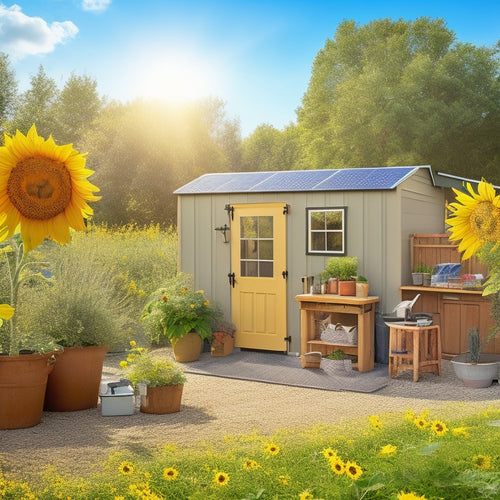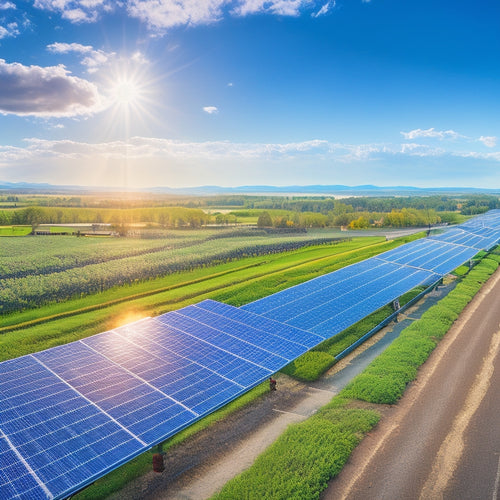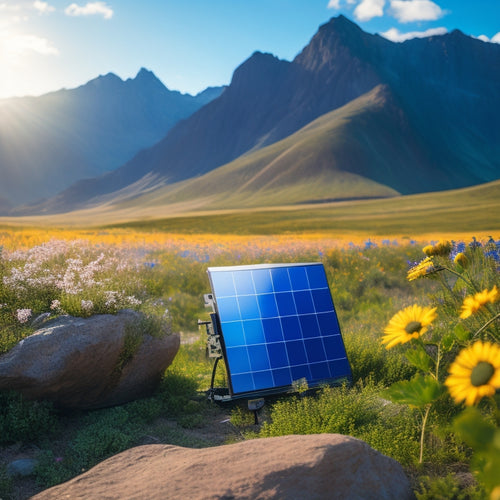
7 Best Solar Panels for Water Pumps
Share
You're considering solar panels to power your water pump, and you want the best options for your system. For ideal energy production, look for high-efficiency panels with advanced cell technology, such as monocrystalline and polycrystalline models, which can increase energy output by up to 20%. Additionally, consider panels with multi-busbar cells and PERC technology for enhanced energy conversion. When selecting a panel, also factor in durability, installation considerations, and budget-friendliness. As you investigate your options, you'll find the perfect combination of performance, reliability, and cost-effectiveness to power your water pump efficiently.
Overview
- For water pumping applications, choose high-efficiency solar panels with advanced cell technology for increased energy production.
- Consider panels with high power output (above 400 watts) and high conversion rates (over 26%) for reliable water pump operations.
- Ensure proper installation with a tilt between 15° to 30° and secure mounting systems to prevent damage and optimize energy production.
- Select durable and weather-resistant panels with corrosion-resistant materials, IP67 ratings, and a 25-year warranty for long-term performance.
- Budget-friendly options with DIY installation and government incentives can make solar water pumps more accessible for small-scale users.
Top Picks for Water Pumping
When it comes to powering water pumps, you need solar panels that can efficiently convert sunlight into electricity. For peak performance, consider monocrystalline or polycrystalline solar panels, which offer higher efficiencies than thin-film panels.
These solar panel types are ideal for water pumping applications due to their ability to generate a stable and consistent power output. Additionally, solar energy integration in rural water pumping systems guarantees adaptability, accessibility, and sustainability reliable water supply.
By reducing reliance on the grid, solar-powered water pumps can provide energy independence and reduce operational costs. During installation, make sure the panels are tilted at an angle between 15° to 30° to maximize energy production.
Additionally, consider installing a charge controller to regulate the voltage and prevent overcharging of your battery. By following these installation tips, you can guarantee a reliable and efficient solar-powered water pumping system that meets your needs.
High-Efficiency Solar Panel Options
When selecting high-efficiency solar panels for your water pump, you'll want to look for options that employ advanced cell technology, which can increase energy production by up to 20%.
For instance, high-efficiency silicon solar cells can achieve conversion rates over 26% under lab conditions, making them suitable for off-grid systems.
These high-performance panels typically feature higher power output ratings, often exceeding 400 watts per panel.
High-Efficiency Cell Technology
As you investigate high-efficiency solar panel options, you'll likely come across models boasting advanced cell technologies that greatly improve energy output. These state-of-the-art innovations focus on enhancing solar panel efficiency, allowing you to generate more power from the same amount of sunlight.
For homeowners seeking energy independence, renewable energy storage solutions like deep cycle batteries and lithium-ion energy storage systems can guarantee a reliable power supply.
One such technology is multi-busbar cells, which increase energy flow and reduce electrical losses. Another is passivated emitter and rear cells (PERC), which enhance photovoltaic technology by adding an extra layer to capture more sunlight.
These high-efficiency cell technologies can remarkably elevate your water pump's performance, giving you more freedom to power your water needs.
Maximum Power Output
By opting for high-efficiency solar panels, you can greatly enhance the maximum power output of your water pump system.
High-efficiency solar panels boast superior solar panel efficiency, allowing for ideal energy conversion. This means you can generate more power per hour of sunlight, resulting in a more reliable and efficient water pump system.
When selecting high-efficiency solar panels, look for models with high power output ratings, typically measured in watts (W). A higher wattage rating indicates a greater maximum power output. For example, a 300W solar panel will produce more power than a 200W panel.
Budget-Friendly Water Pump Solutions
If you're looking to power your water pump without breaking the bank, budget-friendly solar panels can be a cost-effective solution. You can opt for affordable alternatives that still provide reliable performance.
Consider DIY installations to reduce labor costs. A 100-watt solar panel, for instance, can be a suitable option for small-scale water pumping needs. Look for panels with high-efficiency cells and durable construction to guarantee long-term performance.
Additionally, investigate government incentives and tax credits that can help offset the initial investment. By choosing budget-friendly solar panels, you can enjoy the benefits of renewable energy while keeping costs in check.
Durable Panels for Off-Grid Systems
When you're selecting solar panels for off-grid water pump systems, you need ones that can withstand harsh environmental conditions.
Look for panels made with corrosion-resistant materials, such as anodized aluminum or stainless steel frames, to make certain they can resist rust and degradation.
Additionally, weatherproof design features, like sealed connections and heavy-duty construction, are essential to confirm reliable performance in extreme weather conditions.
Corrosion Resistant Materials
Your off-grid system's longevity hinges on its ability to withstand the harsh outdoor environment, and corrosion-resistant materials play an essential role in ensuring the reliability of your solar panels. Corrosion can greatly reduce your solar panel lifespan, leading to increased maintenance requirements and decreased energy output. Look for solar panels with anodized aluminum frames, stainless steel hardware, and tempered glass or ETFE coatings to minimize corrosion risks.
| Material | Corrosion Resistance | Benefits |
|---|---|---|
| Anodized Aluminum | High | Durable, lightweight, and resistant to saltwater corrosion |
| Stainless Steel | High | Resistant to acid and saltwater corrosion, low maintenance |
| Tempered Glass | Medium | Durable, resistant to scratches and cracks, and easy to clean |
| ETFE Coating | High | Resistant to UV, scratches, and corrosion, and easy to clean |
Weatherproof Design Features
Their ability to thrive in harsh outdoor environments makes weatherproof design features a critical component of durable solar panels for off-grid systems.
You want solar panels that can withstand the elements, guaranteeing your water pump keeps running smoothly. Weatherproof design features, such as IP67 or higher ratings, promise protection against dust and water ingress.
This means your solar panels will maintain their performance even in extreme weather conditions, assuring long-term solar panel longevity. By choosing weatherproof solar panels, you're reducing the environmental impact of your off-grid system.
Look for panels with UV-resistant coatings, anodized aluminum frames, and tempered glass to guarantee your solar panels can handle whatever Mother Nature throws their way.
Heavy-Duty Construction
Because off-grid systems are often installed in remote areas, heavy-duty construction is essential to guarantee the solar panels can withstand the rigors of outdoor environments and maintain their performance.
You'll face installation challenges like harsh weather conditions, physical damage, and wildlife interference, so it's vital to choose panels built to last. Look for durable materials, sturdy frames, and secure mounting systems.
Regular maintenance is also key to extending the lifespan of your solar panels. Follow maintenance tips like cleaning the panels regularly, inspecting for damage, and ensuring proper ventilation to prevent overheating.
Panels for Small Water Pumps
When selecting solar panels for small water pumps, you'll want to contemplate models that can efficiently generate power in low-light conditions, as small pumps often require a consistent flow of energy to operate effectively.
Look for panels with high performance metrics, such as high-efficiency cells and low-temperature coefficients, to maximize energy production.
Consider installation tips like angling the panels to optimize energy capture and ensuring minimal shading.
Additionally, choose panels with a low voltage rating to match the pump's requirements.
High-Powered Solar Water Pumps
Operating large-scale irrigation systems or supplying water to entire communities requires high-powered solar water pumps that can handle substantial volumes of water.
You'll need pumps that can produce high pressure and flow rates to meet the demands of these applications. When selecting a high-powered solar water pump, consider the pump's ability to integrate with your solar panel array.
Look for pumps with built-in maximum power point tracking (MPPT) to guarantee peak energy collection. Additionally, consider energy storage solutions, such as batteries, to provide backup power during periods of low sunlight.
This will guarantee a consistent water supply, even on cloudy days. By choosing the right high-powered solar water pump and integrating it with your solar panel system, you can enjoy the freedom and independence that comes with utilizing renewable energy.
Best Value for Residential Use
You're likely looking for a solar water pump that meets your residential needs without breaking the bank.
For a cost-effective solution, consider a 200-300 watt solar panel system, which can efficiently power a small to medium-sized water pump. When selecting a solar panel, prioritize durability and low maintenance requirements. Look for panels with a 25-year warranty and a corrosion-resistant frame.
Proper installation is also essential; make certain a secure and level mounting system to prevent damage from wind or weather. Additionally, follow installation tips such as tilting the panels at an ideal angle to maximize energy output.
Regular solar panel maintenance, including cleaning and inspecting the system, will also help guarantee peak performance and extend the lifespan of your solar water pump.
Frequently Asked Questions
Can I Use Solar Panels to Power a Submersible Water Pump?
You can definitely use solar panels to power a submersible water pump, leveraging solar energy benefits like zero emissions and low maintenance. Guarantee pump efficiency by selecting a panel with a compatible voltage and ampere rating, and a controller that regulates energy flow.
Are Solar Panels for Water Pumps Compatible With AC Systems?
You're wondering if solar panels for water pumps can sync with AC systems; yes, they can, leveraging solar energy benefits to enhance pump efficiency, ensuring a reliable, eco-friendly water supply that frees you from grid dependence.
How Do I Calculate the Required Solar Panel Size for My Pump?
You'll need to calculate your pump's power requirements in watts, considering factors like flow rate and pressure. Then, factor in solar panel efficiency, typically around 20%, to determine the required solar panel size that'll meet your pump's energy demands.
Can I Connect Multiple Solar Panels to Increase Power Output?
As you weave a fabric of energy independence, you're wondering if connecting multiple solar panels will enhance power output. Yes, you can connect them in series or parallel configurations to increase power output efficiency, but be mindful of voltage and current limitations to avoid system imbalances.
Do Solar Panels for Water Pumps Require Special Installation Tools?
When installing solar panels for water pumps, you'll need to take into account wiring considerations and follow specific installation guidelines to guarantee a safe and efficient setup, which may require specialized tools, like wire strippers and crimpers, to get the job done correctly.
Ready to Buy
You've finally narrowed down the best solar panels for your water pump needs. When it comes to utilizing the power of the sun, don't settle for anything less than the best. Remember, when it rains, it pours - and with the right solar panel, you'll be swimming in energy. From high-efficiency options to budget-friendly solutions, these top picks will get your water pumping in no time. Invest wisely, and you'll be reaping the benefits for years to come.
Related Posts
-

Building an Emergency Backup Solar Power System in 5 Essential Steps
Building an emergency backup solar power system involves five key steps. First, assess your daily energy needs to ide...
-

Applications of Photovoltaic Systems
Photovoltaic systems are versatile, converting sunlight into electricity for various applications. You can use them i...
-

High-Efficiency Solar Battery Chargers for Remote Areas
High-efficiency solar battery chargers are essential for your off-grid energy needs in remote areas. They maximize en...


